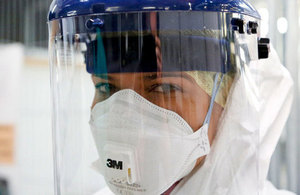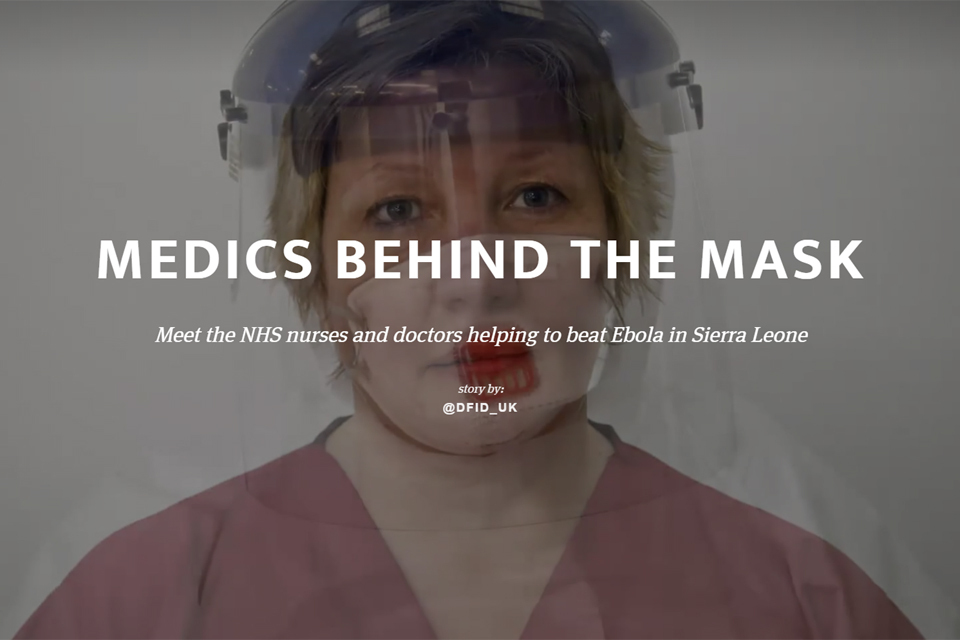NHS volunteers deployed to fight Ebola in Sierra Leone
More than 30 NHS staff from across the UK will depart for Sierra Leone to join Britain’s fight against Ebola.

Military trainers show NHS staff how to put on the safety suits they will wear in Sierre Leone. Picture: Simon Davis/DFID
More than 30 NHS staff from across the UK will depart for Sierra Leone today (22 November 2014) to join Britain’s fight against Ebola, International Development Secretary Justine Greening and Health Secretary Jeremy Hunt have announced.
They are the first group of NHS volunteers to be deployed by the UK government. After arriving in the capital, Freetown, early tomorrow morning where they will complete a week of training before moving to British-built Ebola treatment centres across the country.
Following this training and acclimatisation the group, which includes GPs, nurses, clinicians, psychiatrists and consultants in emergency medicine, will then begin work setting up procedures, diagnosing and treating people who have contracted the deadly virus.
They will work in treatment centres built by British Army Royal Engineers and funded by the Department for International Development.
Justine Greening said:
Our fight against Ebola in West Africa is one of Britain’s biggest responses to a disease outbreak. Almost a thousand military personnel, scientists, healthcare and aid workers are already on the ground in Sierra Leone working to contain, control and defeat this terrible disease.
But to beat Ebola we desperately need the experience and dedication of skilled doctors and nurses to care for the thousands of sick and dying patients who are not receiving the treatment they need.
Every one of these NHS heroes will play a vital role in the fight against Ebola. It is only because of their combined efforts that we stand a chance of defeating this disease.
Meet the medics behind the mask - view feature

Image - a graphic from the Medics Behind The Mask interactive
Health Secretary Jeremy Hunt said:
I want to thank the brave NHS volunteers who are heading to Sierra Leone today to help in the fight against Ebola. They embody the values at the heart of our health service, and their expertise and dedication is second to none.
The NHS volunteers have been prepared for their deployment with 9 days of intensive training at a specialist Ministry of Defence unit in York. This included operating in a replica treatment centre, with members of the Armed Forces training them in the different stages of assessment and treatment of the disease.
On arrival in Sierra Leone, the team will join other international healthcare workers to undergo another week of intensive training funded by the UK to ensure they are equipped with the skills to safely treat and contain Ebola.
After this training, they will be deployed across Sierra Leone according to the staffing needs of the treatment centres built by the UK.
The next teams of volunteers are due to go out in stages in the coming weeks.
Chief Medical Officer, Dame Sally Davies said:
I have been really impressed with the numbers of NHS workers who have stepped forward to help the communities that have been devastated by Ebola.
The fact more than a 1000 have come forward so far is a real testament to their commitment to public service. I want to offer my thanks to all those that are going, their efforts will make a real difference in West Africa.
Professor Tony Redmond, Head of UK Med said:
The actions of these selfless volunteers in going and the actions of their colleagues and managers to release them and cover for their duties is testimony if ever there was to the altruism that lies at the core of the NHS. I am very proud of them all.
Donna Wood, Senior Sister at Haywood Hospital, Staffordshire and Stoke-on-Trent Partnership NHS Trust, who will be travelling to Sierra Leone this weekend said:
I’d been following the stories on the news so when I saw an email from the NHS highlighting the Ebola situation in Sierra Leone and calling for volunteers I felt I had act. I knew I could use the skills I’ve got to make a difference and join a team to help bring the disease under control.
We’ve had gold standard training – second to none. We’re very lucky in this country to have the NHS, the staff and the skills – it’s just not the case everywhere else. My parents and the whole family are proud of my decision to go.
Once they reach full capacity, the Ebola treatment centres will triple Sierra Leone’s bed capacity, bringing the total number of DFID-supported beds to more than 700. The UK already has 1 centre open at Kerry Town, which is being run by Save the Children. The remaining 5 will open in the coming weeks, providing essential care to those in need.
The centres will be staffed by a mix of local, international and NHS volunteer health professionals and run by a variety of organisations including GOAL, International Medical Corps, Medicos del Mundo, Solidarités International and Emergency. Cuba, Norway, Australia, New Zealand, and now Denmark have committed to providing significant numbers of health workers to staff UK treatment centres, alongside the NHS volunteers.
The deployment of NHS volunteers is part of wider UK efforts to control, contain and defeat Ebola. So far the UK has committed £230 million to the response in Sierra Leone.
Notes to editors
-
High resolution pictures are available from: https://www.flickr.com/gp/dfid/738484/. Caption: “The NHS volunteers have spent the past nine days training at a MOD facility in York. The facility is a replica of a Sierra Leone Ebola treatment centre”. Credit: “Simon Davis/DFID”
-
The UK has committed £230 million to the Ebola response in Sierra Leone. This includes:
- supporting more than 700 treatment beds to help up to 8,800 patients over 6 months
- shoring up the country’s stretched public health services to help contain the disease. This includes vital supplies such as chlorine and protective clothing for thousands of health workers
- opening up to 200 Community Care Centres where people who suspect they might be suffering from the disease can seek swift and accurate diagnosis and appropriate care
- building, running and staffing three new labs in Sierra Leone to help check the spread of the deadly Ebola virus, quadrupling the number of tests that can be carried out every day
- supporting charities on the ground to work with people to agree practices which will allow them to honour their friends and relatives, while ensuring bodies are safely buried
- doubling the number of burial teams in Freetown – and providing twenty more across the country. With UK support IFRC burial teams in Sierra Leone’s western area, which accounts for approximately a third of the country’s population, are now burying 100% of reported bodies within 24 hours
- supporting the government of Sierra Leone’s command and control capability – at the national level through support to the National Emergency Response Centre (NERC), and supporting the roll out of District Level Command Centres (DCCs) in high transmission areas
- £5 million aid match for the Disasters Emergency Committee (DEC) appeal on the Ebola outbreak
- more than 800 Ministry of Defence personnel will be deployed in total to help with the establishment of Ebola Treatment Centres and the Ebola Training Academy. This includes the deployment of RFA Argus and three Merlin helicopters, which arrived in Sierra Leone on 30 October.
General media queries (24 hours)
Email mediateam@dfid.gov.uk
Telephone 020 7023 0600
If you have an urgent media query, please email the DFID Media Team on mediateam@dfid.gov.uk in the first instance and we will respond as soon as possible.